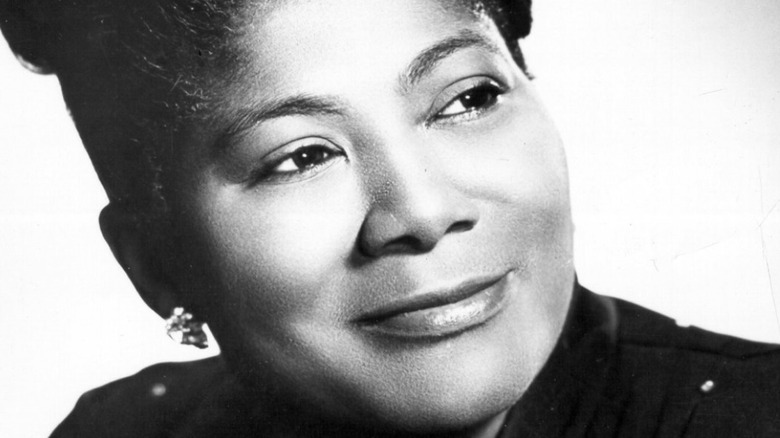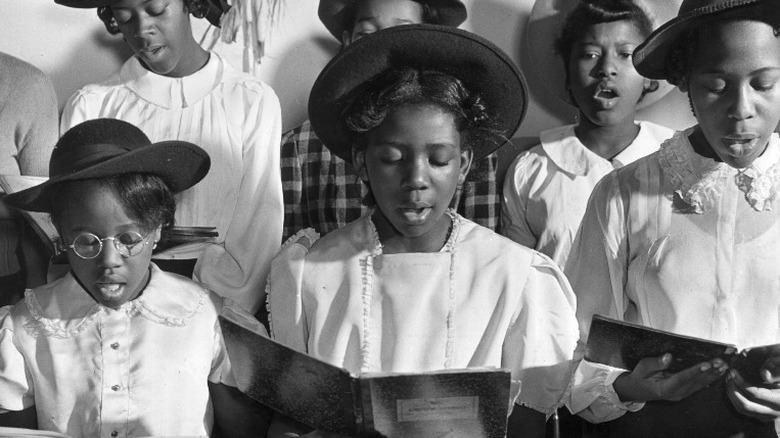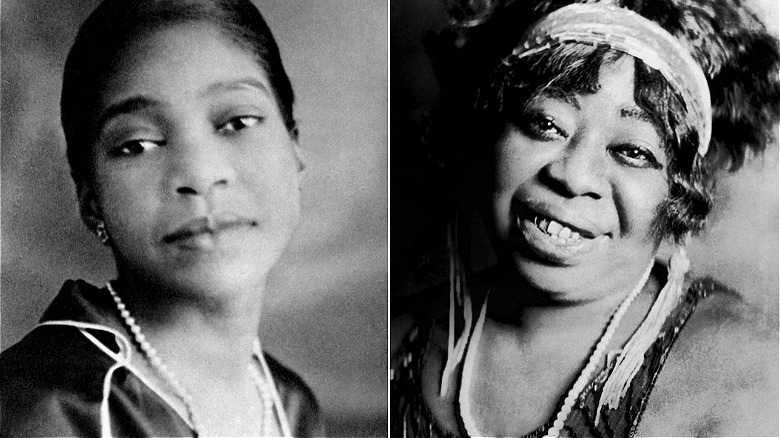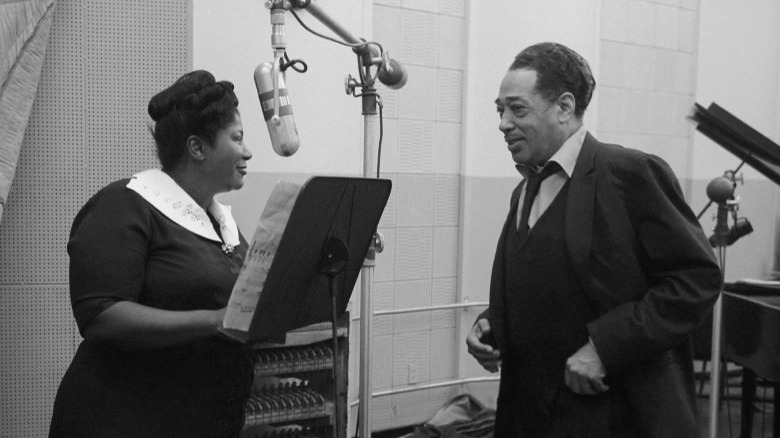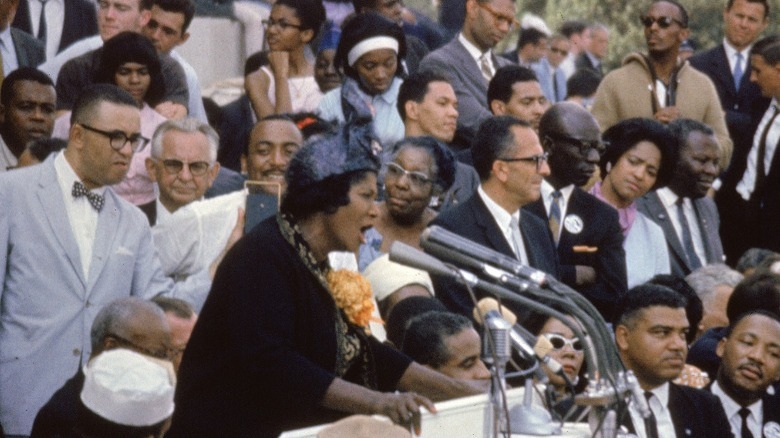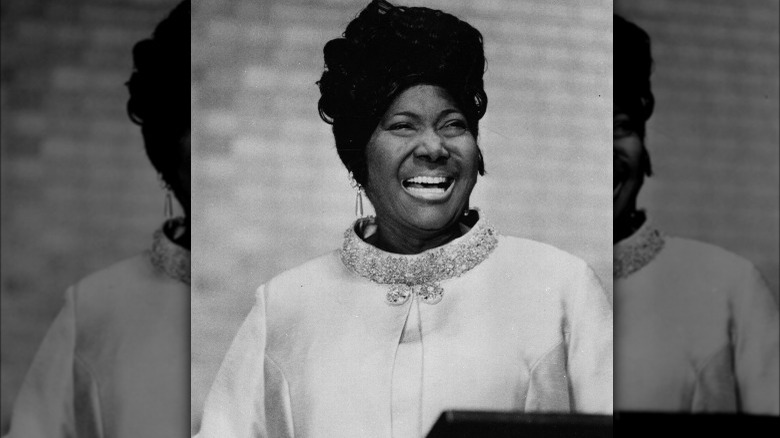How Mahalia Jackson Became The Voice Of The Civil Rights Movement
As History explains, the Civil Rights Movement of the 1950s and 1960s was one of the most influential and important movements in United States history. Slavery had been common practice and completely legal since the beginning of America. While the institution of slavery had officially been abolished with the ratification of the 13th Amendment in 1865 (per History), the descendants of those who had been enslaved were still not treated equally under the law.
Though African-Americans and other abolitionists had been fighting for equal rights for over a century, the 20th century birthed a truly organized social justice movement. It was this time that saw the rise of figures like Malcolm X, Rosa Parks, and Martin Luther King Jr., due to their numerous forms of protest that garnered national attention. While there were many who showed their support for civil rights by marching in the streets, boycotting city services, or participating in sit-ins, some voiced their opinions in other ways. One of those was Mahalia Jackson, and she used her voice (per Biography) to inspire a history-altering campaign.
Early life
Mahalia Jackson was born to Charity Clark and Johnny Jackson on October 26, 1911 (per Biography). A native of New Orleans, she grew up poor, but began singing at the age of 4 at the Mount Moriah Baptist Church. As she got older, she became well known for the gorgeous and powerful sound of her voice which made her stand out pretty early on.
When she was a teenager, Jackson moved to Chicago with the intention of studying nursing. While there she became part of the Johnson Gospel Singers at Greater Salem Baptist Church. She performed around the United States with the group and developed a following, all while working multiple jobs, including as a flower shop owner and beautician. She clearly was not afraid to work hard, and all of that work would pay off when her career really began to take off.
Jackson married in 1936, but that ended in divorce after five years. A second marriage, in 1964, also ended in divorce (per Meaww).
Gospel Singer With A Twist
One of the things that made Jackson's career stand out was the fact that she was able to take gospel music and bring it more to the mainstream. According to Britannica, she was raised in a very strict religious environment, and so gospel was the music she was exposed to. However, your regular church gospel wasn't enough for Jackson, and she began to put her own twist on the classic songs.
Though she was talented enough in her own right, Jackson did find inspiration from other musicians. She was influenced by blues artists like Bessie Smith and Ma Rainey (above), despite the fact that they were both secular artists. Jackson then incorporated the rhythms and emotions often associated with blues music into her gospel songs. There were some who did not appreciate her making changes to the classics, but there were many more who loved her spin on things and her popularity continued to grow.
World-wide superstar
According to Biography, Mahalia Jackson made multiple recordings in the 1930s, but she did not see major commercial success until the end of the 1940s. In 1947, her version of "Move On Up A Little Higher" became the best-selling gospel single in history, selling millions of copies. The success of this song opened doors for her and she began to appear on both TV and radio, as well as going on tour.
One of her most notable performances was in 1950 at Carnegie Hall, appearing in front of a racially integrated audience. This was a big deal at the time due to the fact that much of the country still practiced segregation. Jackson's fame was also not only limited to the United States, as she did a European tour in 1952, where she became extremely popular in countries like Norway and France (per Biography).
Over her career Jackson also appeared on "The Ed Sullivan Show" and performed with jazz great Duke Ellington and his band. She and Ellington later released an album together and she continued to become a prominent figure in the entertainment industry.
Civil Rights icon
Though her popularity grew due to her amazing singing voice, Mahalia Jackson became far more than just an entertainer. According to History, when Jackson performed in Montgomery, Alabama in support of what would become the Montgomery Bus Boycott (via History), she met Martin Luther King Jr. The two became friends and Jackson is said to be one of MLK's favorite opening acts. She performed alongside him for years, leading up to what could be one of the defining moments of her career.
On August 28,1963, Dr. King gave one of the most famous speeches of all time during the March on Washington (per another posting at History). He requested Jackson sing the gospel song, "I've Been 'Buked, and I've Been Scorned," for the crowd of over 250,000 before he spoke. She obliged but also gave King some advice regarding his speech. Jackson reportedly told him, 'Tell them about the dream, Martin.'" He followed her advice and gave what is now known as the iconic "I Have A Dream" speech (also posted at History). She and King remained friends until his assassination in 1968. Jackson then sang at his funeral before subsequently largely withdrawing from the public.
Legacy left behind
Mahalia Jackson gave her final concert in Germany in 1971 (per Biography). Unfortunately she suffered from numerous health issues, which resulted in multiple hospitalizations at this point in her life. Mahalia Jackson passed away due to a heart attack on January 27, 1972.
Though she died at the relatively young age of 60, Jackson made an everlasting impact on those around her. She owned her own businesses and her own home, and stayed true to herself as an artist, despite the pressures from a secular music industry (per Essence). Jackson's music inspired all who heard it, including the next generation of great gospel singers such as Aretha Franklin, Mavis Staples, and Della Reese. At a time where African Americans were being horribly oppressed, she became not only a superstar entertainer, but a civil rights icon in the eyes of the American people. Though many have followed in her footsteps, Mahalia Jackson is still often hailed as the Queen of Gospel.
